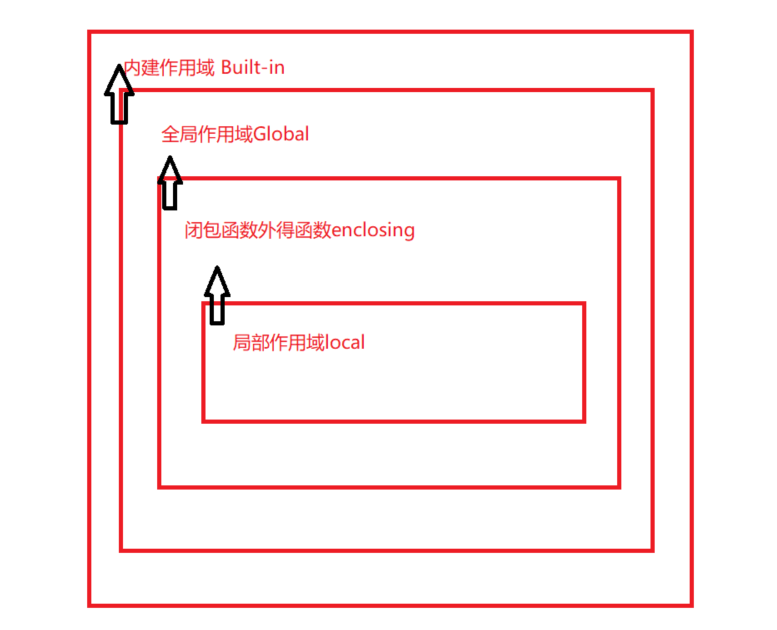Python3基础-函数作用域
参考文档:https://www.runoob.com/python3/python3-namespace-scope.html
作用域
作用域就是一个 Python 程序可以直接访问命名空间的正文区域。
在一个 python 程序中,直接访问一个变量,会从内到外依次访问所有的作用域直到找到,否则会报未定义的错误。
Python 中,程序的变量并不是在哪个位置都可以访问的,访问权限决定于这个变量是在哪里赋值的。
变量的作用域决定了在哪一部分程序可以访问哪个特定的变量名称
作用域类型
- L(Local):最内层,包含局部变量,比如一个函数/方法内部。
- E(Enclosing):包含了非局部(non-local)也非全局(non-global)的变量。比如两个嵌套函数,一个函数(或类) A 里面又包含了一个函数 B ,那么对于 B 中的名称来说 A 中的作用域就为 nonlocal。
- G(Global):当前脚本的最外层,比如当前模块的全局变量。
- B(Built-in): 包含了内建的变量/关键字等。最后被搜索
NAME='小红' #全局作用域 def xiaolu(): name='小路' #闭包函数外得函数Enlcosing print(name) def xiaohuang(): name="小黄" #局部作用域

#内置作用域是通过一个名为 builtin 的标准模块来实现的,但是这个变量名自身并没有放入内置作用域内,所以必须导入这个文件才能够使用它 #python3.0 查看预定了那些的变量 >>>import builtins >>>dir(builtins) ['ArithmeticError', 'AssertionError', 'AttributeError', 'BaseException', 'BlockingIOError', 'BrokenPipeError', 'BufferError', 'BytesWarning', 'ChildProcessError', 'ConnectionAbortedError', 'ConnectionError', 'ConnectionRefusedError', 'ConnectionResetError', 'DeprecationWarning', 'EOFError', 'Ellipsis', 'EnvironmentError', 'Exception', 'False', 'FileExistsError', 'FileNotFoundError', 'FloatingPointError', 'FutureWarning', 'GeneratorExit', 'IOError', 'ImportError', 'ImportWarning', 'IndentationError', 'IndexError', 'InterruptedError', 'IsADirectoryError', 'KeyError', 'KeyboardInterrupt', 'LookupError', 'MemoryError', 'ModuleNotFoundError', 'NameError', 'None', 'NotADirectoryError', 'NotImplemented', 'NotImplementedError', 'OSError', 'OverflowError', 'PendingDeprecationWarning', 'PermissionError', 'ProcessLookupError', 'RecursionError', 'ReferenceError', 'ResourceWarning', 'RuntimeError', 'RuntimeWarning', 'StopAsyncIteration', 'StopIteration', 'SyntaxError', 'SyntaxWarning', 'SystemError', 'SystemExit', 'TabError', 'TimeoutError', 'True', 'TypeError', 'UnboundLocalError', 'UnicodeDecodeError', 'UnicodeEncodeError', 'UnicodeError', 'UnicodeTranslateError', 'UnicodeWarning', 'UserWarning', 'ValueError', 'Warning', 'WindowsError', 'ZeroDivisionError', '__build_class__', '__debug__', '__doc__', '__import__', '__loader__', '__name__', '__package__', '__spec__', 'abs', 'all', 'any', 'ascii', 'bin', 'bool', 'breakpoint', 'bytearray', 'bytes', 'callable', 'chr', 'classmethod', 'compile', 'complex', 'copyright', 'credits', 'delattr', 'dict', 'dir', 'divmod', 'enumerate', 'eval', 'exec', 'execfile', 'exit', 'filter', 'float', 'format', 'frozenset', 'getattr', 'globals', 'hasattr', 'hash', 'help', 'hex', 'id', 'input', 'int', 'isinstance', 'issubclass', 'iter', 'len', 'license', 'list', 'locals', 'map', 'max', 'memoryview', 'min', 'next', 'object', 'oct', 'open', 'ord', 'pow', 'print', 'property', 'quit', 'range', 'repr', 'reversed', 'round', 'runfile', 'set', 'setattr', 'slice', 'sorted', 'staticmethod', 'str', 'sum', 'super', 'tuple', 'type', 'vars', 'zip']
规划顺序: L –> E –> G –>B。
在局部找不到,便会去局部外的局部找(例如闭包),再找不到就会去全局找,再者去内置中找。

注意
Python 中只有模块(module),类(class)以及函数(def、lambda)才会引入新的作用域,其它的代码块(如 if/elif/else/、try/except、for/while等)是不会引入新的作用域的,也就是说这些语句内定义的变量,外部也可以访问
>>>if 1: msg='1223' >>>msg '1223'

#测试1-调用函数 def test(): print("test的函数") print(test) #输出的 <function test at 0x00FD9738> test() #调用函数test() #测试2-调用函数test返回函数test1的内存地址,输出test1的内存地址 def test1(): print("test1的函数") def test(): print("test的函数") return test1 res = test() #返回test1的内存地址赋值给res print(res) #输出 """ 执行结果 test的函数 <function test1 at 0x00FD96F0> """ #测试3-调用函数test返回函数test1的内存地址,再次调用test1() def test1(): print("test1的函数") def test(): print("test的函数") return test1 res = test() print(res()) """ 运行结果 test的函数 test1的函数 None """
#测试1 name='susu' def test(): name='sugh' print(name) def bar(): name='susu' print(name) return bar res = test() res() """ 执行结果 sugh susu """ #测试2 name='susu' def test(): name='sugh' print(name) def bar(): #name='susu' print(name) return bar res = test() res() """ 执行结果 sugh sugh """ #测试3 name='susu' def test(): name='sugh' print('----',name) def bar(): name='susu' print('------',name) return bar test()() """ 执行结果 ---- sugh ------ susu """




 浙公网安备 33010602011771号
浙公网安备 33010602011771号